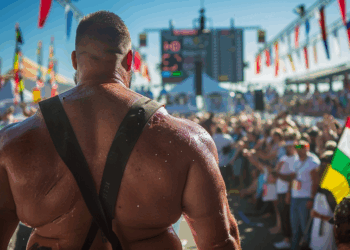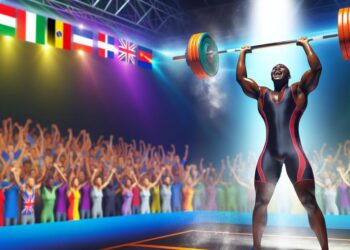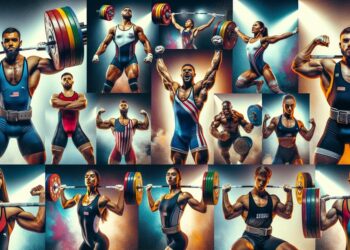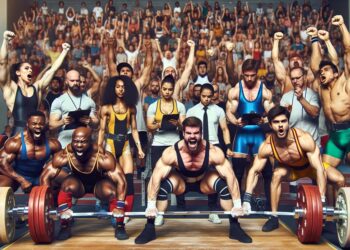Imagine you're at a dinner party, engaged in a conversation about powerlifting. As the topic arises, you hear conflicting opinions and misconceptions being thrown around like weights in a gym. One person claims that powerlifting is only for men, while another insists that it will make you bulky overnight. Amidst the noise, you start questioning what's fact and what's fiction. Well, fear not, because in this discussion, we are here to debunk the myths and shed light on the truth behind powerlifting. So, prepare to have your preconceived notions challenged and discover the reality behind this empowering sport.
Key Takeaways
- Powerlifting is a sport that welcomes individuals of all genders, with women making significant strides and achieving remarkable feats.
- Powerlifting promotes weight loss, improves body composition, and builds lean muscle mass, resulting in a toned and defined physique.
- Proper form and technique in powerlifting are crucial for safety and injury prevention, emphasizing the importance of gradually increasing weight and listening to your body.
- Incorporating cardiovascular exercise into a powerlifting routine aids in muscle recovery, improves endurance, and contributes to overall cardiovascular health.
Powerlifting Is Only for Men
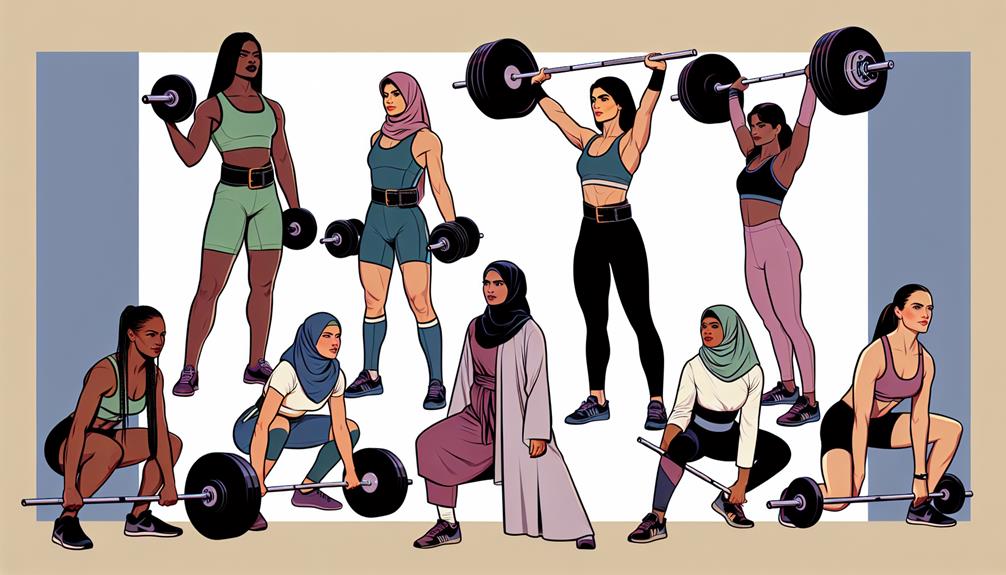
Powerlifting is not just for men; it is a sport that welcomes and empowers individuals of all genders. Contrary to the common misconception that powerlifting is a male-dominated activity, women have been making significant strides in this sport. In recent years, there has been a surge of women participating in powerlifting competitions and breaking records.
Women in powerlifting have proven that they are just as capable as men when it comes to strength and performance. In fact, many female powerlifters have achieved remarkable feats, showcasing their dedication, discipline, and determination. Not only does powerlifting help women build physical strength, but it also instills confidence and fosters a sense of empowerment.
Engaging in powerlifting can offer a multitude of benefits for overall fitness. It is a full-body workout that targets multiple muscle groups, helping to increase muscle mass, improve bone density, and enhance overall body composition. Powerlifting also improves cardiovascular health, increases endurance, and promotes fat loss.
Furthermore, powerlifting provides mental and emotional benefits. The process of setting goals, working towards them, and achieving personal records can boost self-esteem and mental resilience. Powerlifting also encourages discipline, perseverance, and mental focus, which can be applied to other areas of life.
Powerlifting Will Make You Bulky
While powerlifting is often associated with the misconception that it will make you bulky, the reality is quite different. Powerlifting is actually an effective way to promote weight loss and improve overall body composition. When you engage in powerlifting, you challenge your muscles to lift heavy weights, which in turn increases your metabolism and helps you burn calories even after your workout is over. Additionally, powerlifting helps to build lean muscle mass, which can give you a more toned and defined physique rather than a bulky one.
To further debunk the myth, let's take a look at the following table:
| Myths about Powerlifting | Facts about Powerlifting |
|---|---|
| Powerlifting makes you bulky | Powerlifting promotes weight loss and improves body composition |
| Powerlifting is only for men | Powerlifting is for anyone who wants to increase strength and improve physical performance |
| Powerlifting is dangerous | Powerlifting, when done with proper form and technique, is safe and can even reduce the risk of injury |
As you can see, powerlifting and weight loss go hand in hand. It not only helps you shed excess pounds but also increases your strength and overall fitness level. Additionally, powerlifting has numerous mental health benefits. It can boost your confidence, reduce stress levels, and improve your overall mood. So, don't let the fear of becoming bulky deter you from giving powerlifting a try. Embrace the challenge, reap the rewards, and enjoy the transformative power of this incredible sport.
Powerlifting Is Dangerous and Leads to Injuries
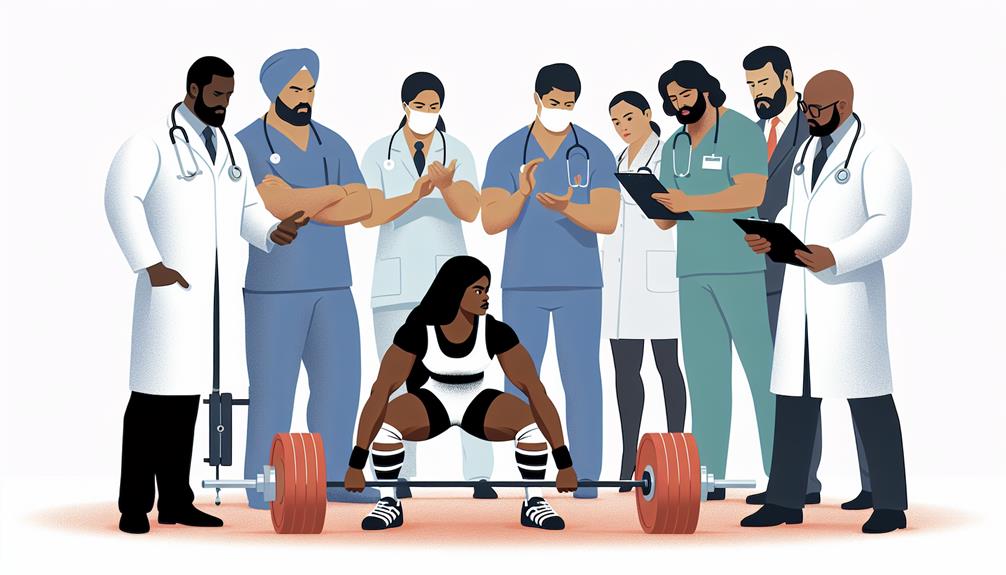
If done with proper form and technique, powerlifting can be a safe and effective way to build strength and reduce the risk of injury. Contrary to popular belief, powerlifting is not inherently dangerous. In fact, it can be a great way to improve your overall physical fitness and enhance your athletic performance.
To prevent powerlifting injuries, it is crucial to prioritize proper technique and form. This means learning the correct way to execute each lift and gradually increasing the weight as your strength improves. Additionally, it is important to listen to your body and give yourself enough time to recover between training sessions. Overtraining can lead to fatigue and increase the risk of injury.
Another misconception about powerlifting is that it is solely focused on lifting heavy weights and neglects cardiovascular fitness. However, incorporating cardio into your powerlifting routine can offer numerous benefits. Cardiovascular exercise improves heart health, increases stamina, and enhances overall endurance. It can also aid in muscle recovery by promoting blood flow to the muscles.
Powerlifters Don't Need to Do Any Cardio
Incorporating cardiovascular exercise into a powerlifter's training routine offers numerous benefits. Contrary to popular belief, powerlifters can greatly benefit from adding cardio to their training regimen. Here are some key reasons why:
- Improved Endurance: Cardiovascular exercise helps to increase your overall stamina and endurance levels. This means that you'll be able to maintain a high level of performance for longer periods during your powerlifting sessions.
- Faster Recovery: Engaging in cardio can aid in speeding up your recovery time between heavy lifting sessions. By improving blood flow and oxygen delivery to your muscles, cardio helps to reduce muscle soreness and promote faster recovery.
- Heart Health: Powerlifting primarily focuses on building strength and muscle mass, but neglecting cardiovascular health can have negative long-term effects. Incorporating cardio into your routine helps to improve heart health, lower blood pressure, and reduce the risk of heart-related diseases.
To balance cardio and strength training for powerlifting success, it's essential to find the right balance. Aim for two to three cardio sessions per week, focusing on low-impact exercises such as cycling or swimming. Keep your cardio workouts shorter in duration (around 20-30 minutes) and at a moderate intensity level, so as not to interfere with your strength training gains.
Powerlifting Is Not a Legitimate Sport
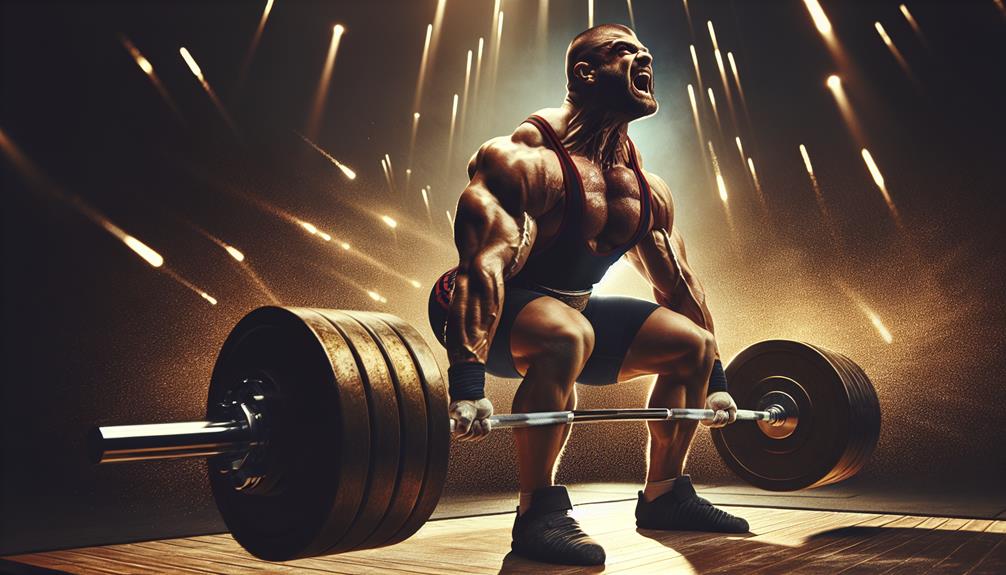
Is powerlifting really a legitimate sport or just another form of exercise? Many people believe that powerlifting is simply a hobby or a recreational activity, but this couldn't be further from the truth. Powerlifting is a misunderstood discipline that requires immense strength, technique, and strategy. It is not just about lifting heavy weights; it is about pushing your body to its limits and competing against others in a structured and organized manner.
Powerlifting is recognized as a sport by various international organizations such as the International Powerlifting Federation (IPF) and the International Olympic Committee (IOC). These organizations have set strict rules and standards that powerlifters must adhere to in order to compete at the highest level. Powerlifters train for years to perfect their technique and maximize their strength, just like any other athlete in a mainstream sport.
Furthermore, powerlifting competitions are highly competitive and require strategic planning. Lifters must carefully select their attempts based on their capabilities and the performances of their competitors. It's not just about lifting as much weight as possible; it's about making calculated decisions to secure the highest total.
Frequently Asked Questions
Is Powerlifting Only for Men or Can Women Also Participate and Excel in the Sport?
Powerlifting isn't just for men; women can participate and excel in the sport too. In fact, there has been a significant rise in the number of women in powerlifting, proving that gender inclusivity is a reality.
Will Powerlifting Make Me Bulky and Give Me a Bodybuilder-Like Physique?
Powerlifting won't make you bulky like a bodybuilder. It focuses on strength and power, not hypertrophy. However, it can help with weight loss as it increases muscle mass and boosts metabolism.
Are Powerlifting Movements Inherently Dangerous and Likely to Cause Injuries?
Powerlifting movements may seem dangerous, but with proper form and technique, injuries can be prevented. Common powerlifting injuries include strains and sprains. Incorporating warm-up exercises and following a progressive training program can help minimize the risk. Powerlifting offers numerous benefits for overall health and fitness.
Do Powerlifters Exclusively Focus on Strength Training and Neglect Cardiovascular Exercise?
Do powerlifters only focus on strength training and ignore cardiovascular exercise? No, that's a myth. Powerlifting actually offers cardiovascular benefits and can aid in weight loss. So, don't underestimate the power of powerlifting for overall fitness.
Is Powerlifting Considered a Legitimate Sport With Recognized Competitions and Governing Bodies?
Powerlifting is a legitimate sport with recognized competitions and governing bodies. It has its pros and cons for inclusion in the Olympics, and the role of performance enhancing drugs in competitions is a topic of discussion.
Conclusion
So, there you have it – powerlifting myths debunked! Contrary to popular belief, powerlifting is not only for men. In fact, there are many women who excel in the sport. Additionally, powerlifting will not make you bulky, but rather it helps build strength and muscle definition. While injuries can occur in any sport, proper training and technique can greatly minimize the risk in powerlifting. And yes, powerlifters do need to do cardio for overall fitness. With over 10,000 registered powerlifters in the United States alone, it's clear that powerlifting is indeed a legitimate and thriving sport.





